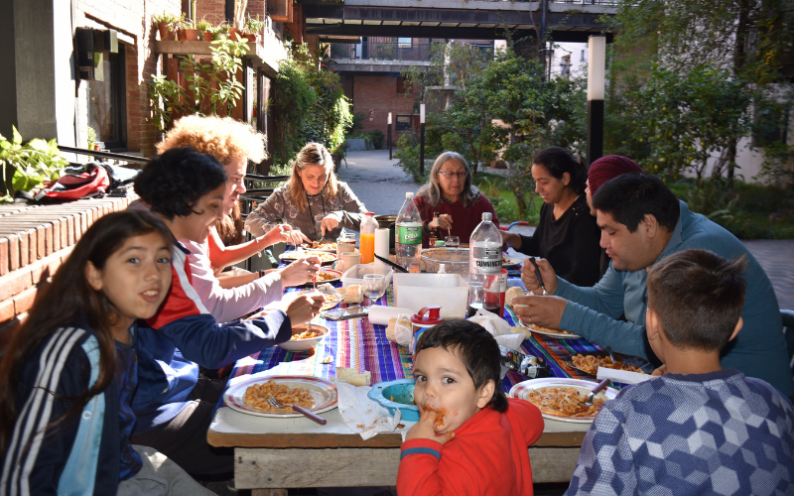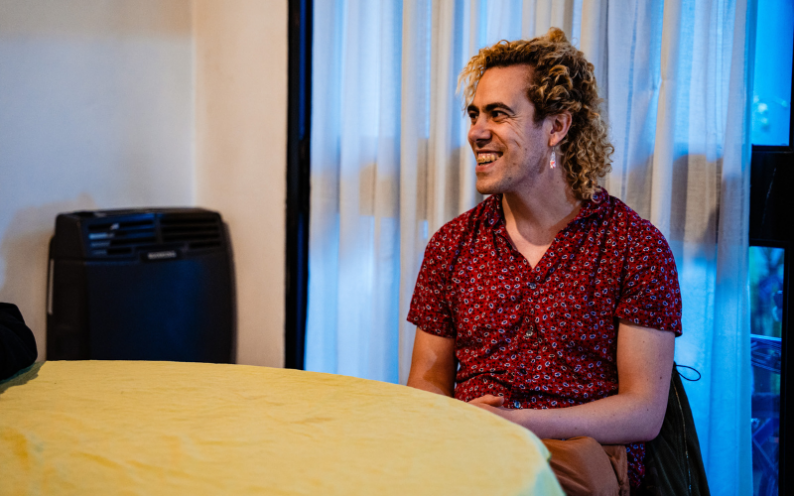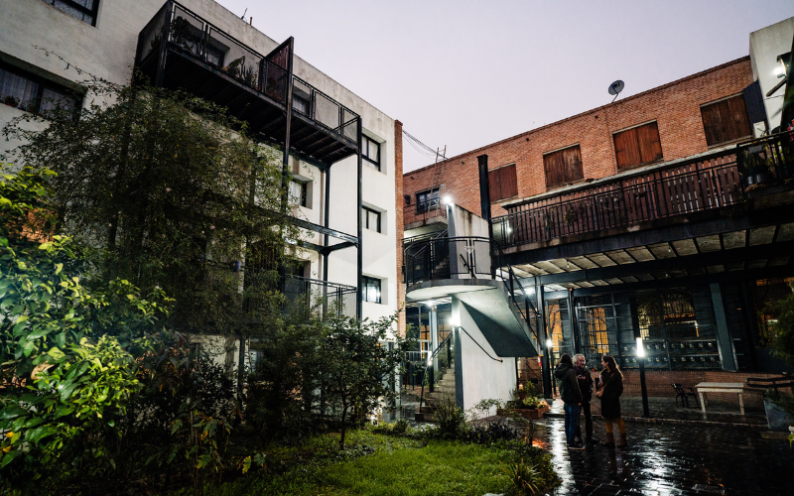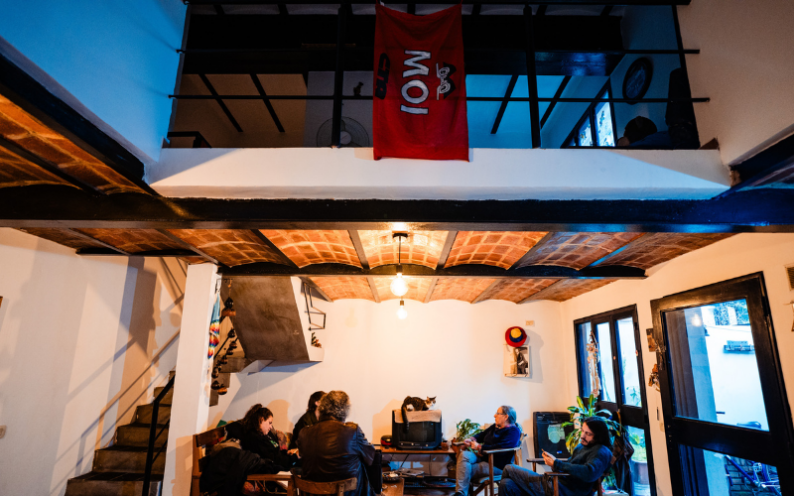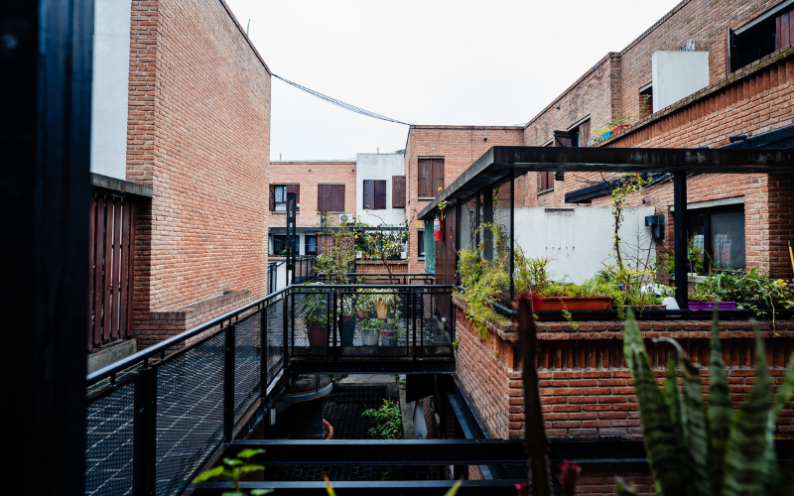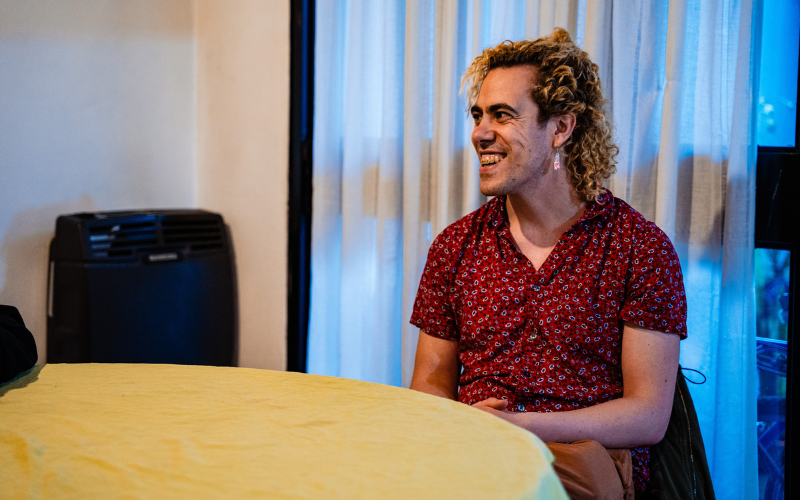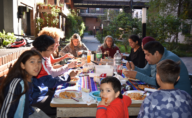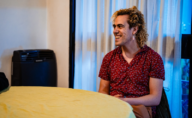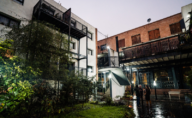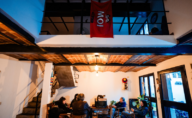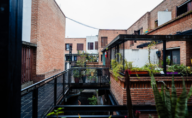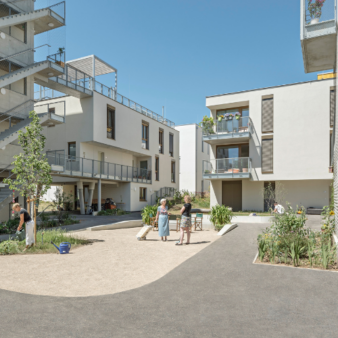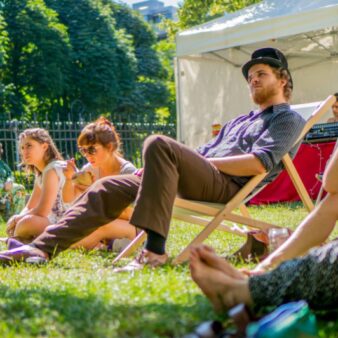Argentina is experiencing the highest poverty rates seen in 20 years, coupled with soaring inflation and rental prices, making the situation worse. Many of Buenos Aires’ residents are living below the poverty line and are unable to afford a decent home.
The Occupants’ and Tenants’ Movement (Movimiento de Ocupantes e Inquilinos, MOI also known as the Federation of Self-Managed Cooperatives), has a track record of fighting poverty, as well as habitat and housing injustice in Argentina. It is also the organisation behind La Fábrica: a housing cooperative offering 50 well-designed and affordable homes. The development provides a crucial lifeline to individuals and families on low incomes, giving them access to secure and dignified housing from which they can access the city for work and leisure.
Originally a textile manufacturing complex, today La Fábrica is home to 150 people, 40% of whom live under the poverty line. Construction started in 2007 and residents moved in in 2017. That group remains intact. The housing units are duplexes of two, three or four bedrooms, and each has a private patio and double height living space. La Fábrica also features shared courtyards, a multipurpose room, and a commercial space, which seamlessly connect the complex to the surrounding neighbourhood.
La Fábrica’s community grew out of the creation of MOI’s cooperatives, becoming one of the first self-management experiences in Argentina’s Popular Habitat movement. This was made possible by Law 341 and its Self-Management Housing Program (PAV), the first law of its kind in the country, which MOI helped to create.
Participants, who are often women, are selected based on their housing needs and their willingness to get involved. The cooperatives work with the Federation and its Interdisciplinary Professional Teams (EPIs) to go through a preliminary training stage called “Guardia.” During this stage, they make essential decisions about land access, ownership models, and the organisation of the Social Unit for Self-Managed Production (Unidad Social de Producción Autogestionaria or USPA):
Future residents also have access to affordable temporary housing through Transitional Housing Programs (PVTs). This helps them stay housed throughout the process and provides them with a valuable experience of cooperative co-living.
The process emphasises skills development, community engagement, and collective management of shared spaces. This model challenges traditional property ownership and makes residents feel they have more say and influence over their future homes.
Social Impact
A three-pronged model creates what is called ‘the Social Unit for Self-Managed Production ‘(Unidad Social de Producción Autogestionaria or USPA). It is made of:
- The Housing Cooperative, for the empowerment of the residents who make it up, plays a crucial role in shaping the project. Residents actively participate in decision-making from the initial planning phases to contributing mutual support (sweat equity) during construction.
- The Work Cooperative “Casa Base” is the skilled workforce for the execution of the construction works. It provides qualified labour, tools and machinery, ensuring a high-quality work. It also creates job opportunities for residents of other MOI’s cooperatives and partner organisations, boosting the economic empowerment of the broader community.
- MOI’s Interdisciplinary Professional Team (EPI) offers architectural, legal, social, and accounting support throughout the process. It helps overcome legal hurdles and adhere to best practices in construction, and offers support to the community so that they work together effectively.
La Fábrica’s social impact goes beyond providing homes. MOI promotes the Strategic Habitat Concept, a holistic approach that offers:
- A nursery with more than 500 children passing through its classrooms.
- A community qualification, which has seen 100 women and young people complete their secondary studies.
- The Community Integration Programme (PIC), which has provided dignified homes to 10 psychiatric hospital outpatients.
- A Transitional Housing Programme (PVT), which allows families to gain first-hand experience of cooperative co-living, gives them somewhere to live during the stages of the cooperative’s formation and the building’s construction (in the case of La Fábrica construction took 10 years).
More widely, La Fábrica and its sister housing developments would not have been possible without MOI’s historical work on the creation of Law 341 in Buenos Aires, which now makes raising finance possible and ensures citizens’ rights to a beautiful habitat, decent housing and aims for a city with evictors or evictees.
Environmental impact
By using the existing building structure, La Fábrica saved embodied carbon. Locally sourced and refurbished materials were used wherever possible. Building double walls with air chambers improved natural insulation, and the incorporation of skylights in every home maximised natural light, and reduced energy consumption. These strategies demonstrate a deep commitment to protecting the environment.
Funding
The project cost was $1.5 million USD, financed through Law 341’s budget and its Self-Management Housing Programme (PAV), and a loan facilitated by the City’s Housing Institute (IVC). The loan boasts a 0% interest rate and a 30-year repayment term. The cooperative is responsible for this amount and for a minimal monthly maintenance fee. These terms significantly reduce housing costs for the cooperative members ($358 USD psm, compared to up to $2,000 USD psm for equivalent properties for sale in the area), making La Fábrica a truly affordable habitat and housing solution.
Transfer and expansion
Currently, MOI is planning similar projects, and it also manages land and financing for new housing units in Rosario and Santa Fe. With a focus on advocating for public policies for Self-Managed Production of Popular Habitat, MOI relies on local government support —at the city and province levels— to implement new Self-Managed Cooperative Projects, especially for the most vulnerable groups.
Looking to the future, MOI wants Law 341 to be recognised at a national level. To this end, it lobbies at National Congress for the National Bill for the Social Self-Managed Production of Popular Habitat (Producción Social Autogestionaria de Hábitat Popular, or PSAHP).
While a visit to FUCVAM (former World Habitat Awards winner in Uruguay) in 1990 inspired La Fábrica’s residents in the early stages of the project, MOI, in turn, shares its knowledge and practices with partners of the Latin American Secretariat for Housing and Popular Habitat (Secretaría Latinoamericana de la Vivienda y el Hábitat Popular, or SELVIHP), in Chile, Brazil, Peru, Venezuela, Ecuador, Panama and Mexico, part of the “Patria Grande”, which was formed in 1990 in Montevideo.
Why it’s a World Habitat Award winner
MOI’s unique three-pronged approach gives cooperative housing projects the support they need, encourages diversity and inclusion, and promotes economic empowerment, the strategic self-management concept, and the right to beauty for our peoples’ habitat. La Fábrica shows that despite today’s severe economic conditions, it is possible —and necessary— to build a strong community, and permanently affordable, environmentally responsible and beautiful housing, as well as creating better legal conditions for the most vulnerable people in society.
Download your copy of the full project summary
 Argentina’s economic crisis has deepened levels of poverty and made housing inaccessible for many. In Buenos Aires, the rapid wave of profit-driven redevelopment has made this issue even worse, pushing low-income residents to the fringes. The Occupants’ and Tenants’ Movement (MOI, also known as Federation of Self-Managed Cooperatives), challenges this trend with La Fábrica, a housing cooperative, offering affordable and high-quality homes for those in need in the heart of Buenos Aires’ central Barracas district.
Argentina’s economic crisis has deepened levels of poverty and made housing inaccessible for many. In Buenos Aires, the rapid wave of profit-driven redevelopment has made this issue even worse, pushing low-income residents to the fringes. The Occupants’ and Tenants’ Movement (MOI, also known as Federation of Self-Managed Cooperatives), challenges this trend with La Fábrica, a housing cooperative, offering affordable and high-quality homes for those in need in the heart of Buenos Aires’ central Barracas district. 